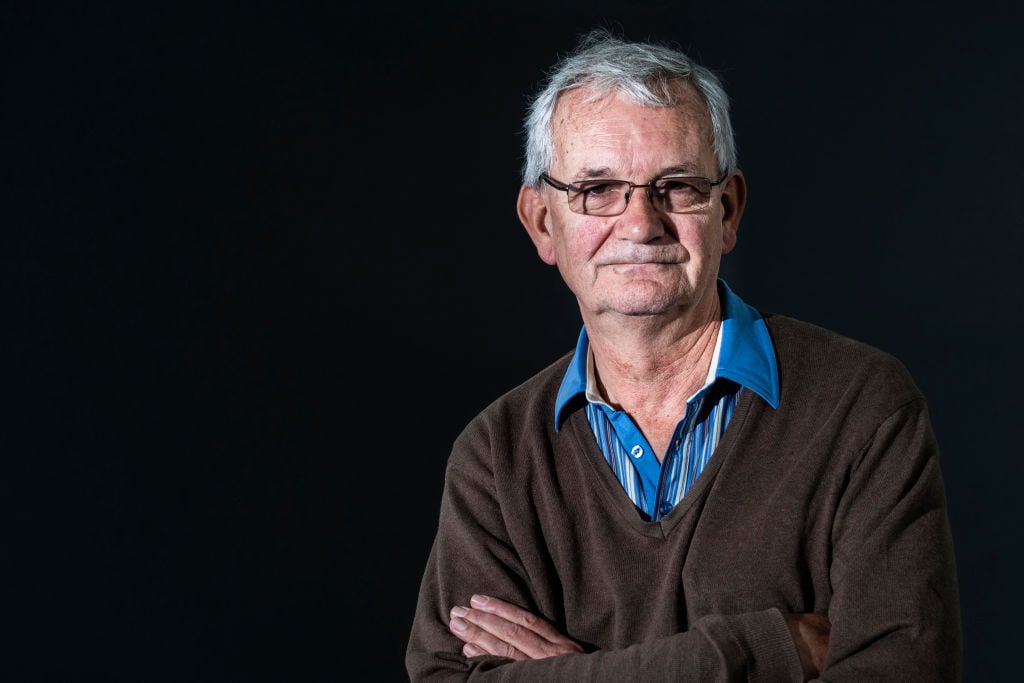
Martin Parr, the renowned photographer of British life, has resigned as artistic director of the Bristol Photo Festival following a student-led protest alleging racial insensitivity.
Parr came under fire for contributing an introduction to a 2017 reissue of a 1969 photography book titled London by the late Italian photographer Gian Butturini that has been accused of featuring racist imagery.
The book of black-and-white photographs, taken in late ’60s London, includes a picture of a Black woman on one page, with the facing image presenting a photo of a gorilla at a zoo.
Mercedes Baptiste Halliday, a 20-year-old University College London anthropology student, received London as an 18th-birthday present from her father and was shocked to see Butturini’s “appallingly racist” spread, she told the Art Newspaper.
Baptiste Halliday first called attention to the problematic juxtaposition on Twitter last May, writing that she was “utterly horrified and appalled” by the imagery. She also picketed a Parr exhibition at London’s National Portrait Gallery.
In addition to stepping down from the photo festival, Parr has published an apology, calling the photo spread in question “offensive and demeaning” and his failure to notice it “inexcusable.”
He has asked that remaining copies of the book to be removed from sale and destroyed, while pledging to donate the fee he received for writing the essay to a relevant charity.
When Parr first addressed the controversy, in December on Twitter, it was mainly to clarify that, contrary to claims published in Phoblographer in June 2019, he didn’t edit the book.
“Of course, I should have picked up on the spread, but regretfully did not,” Parr wrote. “I fully acknowledge the highlighted spread is racist & am sorry for offence [sic] caused.”
Parr responded to the allegations more fully this month after MA photography students at the University of the West of England in Bristol cancelled their annual end-of-year exhibition, “Quote Unquote,” the day it was set to open at the Martin Parr Foundation.
The students had been in contact with Baptiste Halliday about her complaints against Parr.
In an email exchange that Baptiste Halliday posted on Twitter, Parr told her he was “ashamed” of his association with the 2017 volume. “I must have seen the spread in question, but had not logged its implication, an oversight that I deeply regret.”
“Considering your position as a photographer, I find it embarrassing that a racist juxtaposition was overlooked,” Baptiste Halliday responded. “The comparison of black women to monkeys and gorillas is a well-known racist trope, and, as someone who claims visual literacy, most reasonable people would have expected you to spot this. Furthermore, the publisher Damiani should have also noticed this. Clearly, there were failures at every level.”
In a statement, Parr said he resigned from the Bristol Photo Festival because “I felt my continued presence as artistic director would provide an unnecessary distraction from the wonderful work being exhibited by the festival artists and that stepping back was the best course of action for everyone.”
In response to the controversy, the festival announced on Twitter that it would be replacing the artistic director role as well as forming a three-person committee to “oversee the design of future festival exhibitions and activities.”
The book’s publisher, Damiani, “is considering withdrawing the remaining copies of the book from the market” due to its “values of tolerance, mutual respect and peaceful coexistence,” a representative for the publisher told Artnet News in an email.
But the spokesperson added that the company “does not consider the accusations of racism against the work of G.Butturini and the work of M.Parr to be well-founded.”